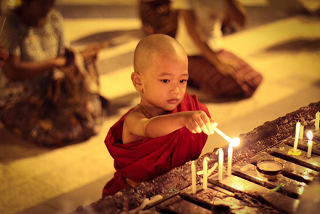
Preface: As I am sitting here writing the opening to this book, I have my iPod plugged in and Behemoth’s Inferno rattling my eardrums with his insane drumming.
I thought long and hard after years of working with abused teens, prisoners and addicts about how to connect to them in a way that didn’t seem like dogmatic preaching.
Over and over again, it was my appearance that drew them in. At 6’1” and 260 pounds, I am a large fellow. I am also covered in tattoos, large gauge earrings, and a beard that would make Paul Bunyan a mighty bit jealous.
I was reading this morning, after my meditation, and something struck me. It was a quote from Buddhist monk and peace activist, Thich Nhat Hanh:
“The truth must be presented in ways that others can accept…”
Finally I realized that it was all that thinking that was getting in my way.
Why not use the tools that best helped me relate to those I work with? They relate to me because I look relatable based on their experience.
It is my experience as an angry, introverted teen, turned angry tattooed bouncer, turned heavily tattooed and pacifist Buddhist; that I hope to relay in this simple text. There are only going to be twelve short chapters and they will address the fundamental aspects of what being a Buddhist is. There will be no dogma, no judgments, no lists of sins that you cannot commit else you risk facing eternity in hell. It will be simply the basic teachings, the very first teachings, of the man called Buddha.
I will present the Four Noble Truths and the Eightfold Path, in chapters that relate to our lives, as we live them. Don’t think of this as a religious text, full of thou shalt and thou shalt nots. Instead, it will be a basic text on how to live with ourselves, mindfully and peacefully, while dealing with a world that seems to be in chaos. So, sit down, jack up the metal and maybe, just maybe, I’ll say something worth listening to; or, maybe not.
Oh, and by the way, scream-o isn’t metal. It’s worse than being a hipster.
Introduction
So, what is Buddhism? Why should we even bother reading some other weird old preacher’s BS on how to live our lives?
Here is the catch. I am not presenting you with a religion, no matter what the people at AA or at church tell you. Buddhism is a moral philosophy, and that’s it, period. The Buddha himself said he wasn’t interested in followers or devotees or people worshiping him like some long dead idol.
What he did say, however, was that he was interested in people learning to truly think for themselves—in learning to question authority in a healthy way and rebelling against a corrupt system.
I mean, come on, that right there is cool enough to at least stop and listen to.
Questioning authority, thinking for ourselves (ummm, hello—that’s metal right there!)? He even said not to take his word on anything! He said that he was offering a set of teachings to help people deal with pain and suffering. Take it for a test drive, don’t believe anything I tell you, or anyone else tells you, for that matter, unless you have tried it out for yourself and seen it to be true.
Here is something else the Buddha said, “I teach suffering and the end of suffering and that is it.” How many of us haven’t had to deal with pain and suffering? Crappy parents, mean teachers, drugs, bad decisions, broken hearts?
I came from an abusive home. My father was a cop who liked to love me with his fists. I was also extremely introverted.
I think that is what drew me to death metal in the first place. It soothed me in a way because it expressed what I was feeling inside. I was angry and I was suffering. Sadly, I carried that anger and suffering along with me into being an adult.
It was that anger and suffering that almost killed me. I let it control me. I allowed it to dictate what decisions I made and what else I did—like using chemicals to make me feel bigger and stronger and more powerful. Those chemicals, along with a heart condition that I didn’t know I had, put me into the emergency room and on a heart transplant list because I ended up suffering from severe heart failure.
Don’t get me wrong. This isn’t a, “Hey, look, Buddha/Jesus saved my life,” story. Look at your own life. How many friends or idols have died because their suffering got in the way? Wasn’t too long ago that Mitch Lucker died (singer for Suicide Silence). I can rattle off a few dozen more, as I am sure you can as well.
This is just a story about what we all experience—suffering, and how we can deal with it.
Just like the Buddha said, “Suffering and its ending.”
So, strap on your big boy/girl pants and give it a chance; if it doesn’t work, throw it out.
If it does or if you’re at least willing to give it a shot…I am here to walk the steps with you.
Namo Buddhaya,
Ty
Chapter One
The Truth of Suffering
“There is no burn like passion, there is no pain like hatred, there is no trap like folly, and there is no freedom from greed.” ~ Buddha
When the Buddha gave his very first speech, he talked about what we call the Four Noble Truths. The first Noble Truth that I am going to write about is the truth of suffering.
Sounds bleak right?
Sounds like I am starting the first chapter in an emo novel. “Woe is me…life sucks man.” Okay, okay…
So, what are we talking about here? Suffering and the aspects of suffering that we have to deal with.
How many of you have experienced some form of loss—the death of a pet, or a loved one, the loss of a friend or a lover, the ending of a first relationship or an abusive relationship? Parents who never stop fighting or yelling, a hero reported dead in the news. Maybe being picked on or bullied? Maybe dealing with bad acne, or a limp, or bad scars that left feelings of self-consciousness.
When I was young, and all through high school, I was terribly shy and introverted. My father was, well, honestly, he was a dick. He liked to hurt people, and that included me and my mother. He used to tell us that it literally got him high to cause people pain. I had a hard time being put on the spot, speaking in front of others, talking to girls—basically all of it was hard for me.
I wasn’t good at sports, I did poorly in school and my only solace felt like my books and my music. I am sure many of you can relate at least on some level to understanding that life can suck sometimes. This is what the Buddha was saying when he said the first step to freedom is accepting that there is going to be pain and hurt.
Many people have confused Buddhism with being a depressing and nihilistic philosophy. We talk about things like suffering and death and non-attachment and emptiness. However, this isn’t what we are getting at when we talk about the truth of suffering.
When we talk about suffering or anxiety or loss, fear, anger, loneliness et cetera, we are talking about accepting reality. That is the start to dealing with the suffering we come face to face with.
I know it seems easier to lash out, run away, swing a fist, argue or scream and yell at everyone who pisses us off, but that in itself causes more drama—a prolonged issue to deal with, and in the long run, more suffering. Look at it this way. “This kid was pissing me off, talking trash, so I decked him!”
Your friends cheer you on, you feel a little bit better about it—but then, you get detention, or suspended, or time on county and the drama of parents who are ticked off. This cycle of suffering was prolonged over a brief moment of trying to feel better, over a situation you couldn’t control to begin with. This is what lies behind all suffering.
So when I talk about suffering, I am not saying to go sit in the dark and play Rammstein and be pissed off at the world because everything sucks and we can’t change it. I am saying that there is a reality of life that everyone has to deal with. We all experience loss and suffering. We aren’t alone in being the only pissed off kid in school or on the planet. The kid you just punched, maybe he is a bully because his dad beats him at home and tells him he is worthless. He deals with his suffering by bullying others. It isn’t right, but that’s his reality.
Maybe the girl people call a slut and seems to sleep around or use her body to get attention doesn’t get any attention from her parents. Maybe they tell her she is ugly and worthless, but when people pay attention to her for her body, she feels better for a few minutes.
Suffering exists for everyone.
Accepting this as a reality is the first way to move past it—to let go of our anger and doubt. Just remember, we may be suffering, but someone, somewhere, has it worse off than we do.
One of my favorite teachers, the Vietnamese Buddhist monk, Thich Nhat Hanh has the perfect quote for the close of this chapter:
“When another person makes you suffer, it is because he suffers deeply within himself, and his suffering is spilling over. He does not need punishment; he needs help. That’s the message he is sending.”
Love elephant and want to go steady?
Sign up for our (curated) daily and weekly newsletters!
Apprentice Editor: Kristin Monk/ Editor: Jenna Penielle Lyons
Photos: Pixoto, Pixoto, Pixoto










Read 3 comments and reply